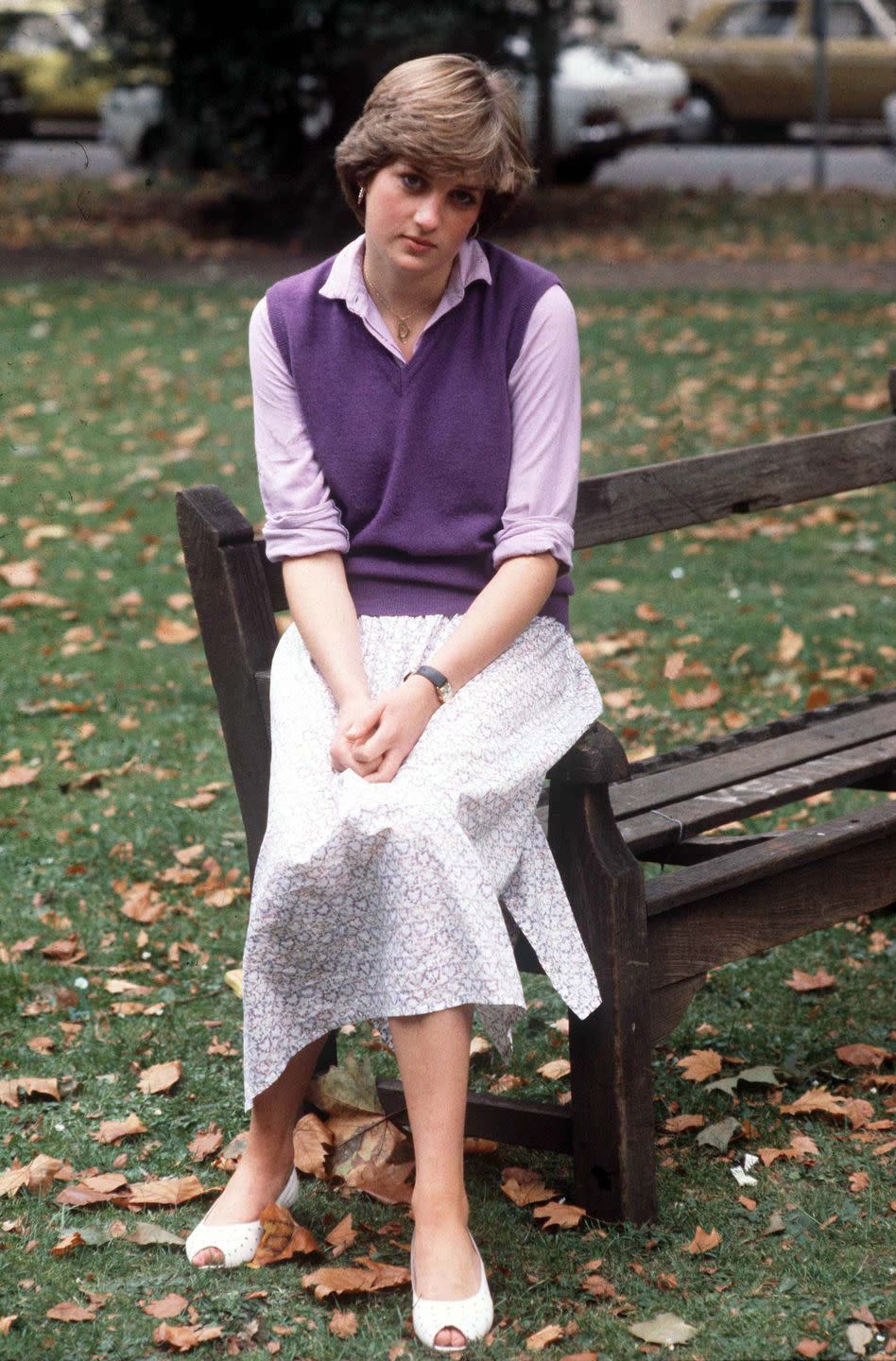It’s been decades since Diana’s battle with bulimia, but society still isn’t handling it properly

Jeni was 20 years old, going into her second year of university in Leicester, when she first started making herself sick. Her boyfriend had suddenly left her, leaving her heartbroken with very low self-esteem.
“Because of the break-up, I just didn’t have an appetite,” Jeni says, “then people started commenting on the fact I’d lost weight. It made me feel good at a time when my confidence was at an all-time low. I thought, ‘How can I keep this up?’”
That’s when she started the binge-purge cycle; uncontrollably eating large quantities of food before forcing herself to vomit. “I’d go to the corner shop and buy a ridiculous amount of food – triple sandwiches, big bags of crisps, sweets and fizzy drinks – binge-eat them in a specific order, then purge until there was nothing left. It completely took over my life.”
When Jeni saw her doctor, she was told that her potassium levels were so low – due to electrolyte imbalances caused by vomiting – that she was at risk of having a heart attack. She was referred for therapy but relapsed dangerously five years later, making herself sick around six times a day.
“I was scared so eventually I went to my GP for help,” Jeni says. “But my doctor told me I wasn’t underweight enough for treatment. I was crushed. I’d always felt like a fraud for having an eating disorder and not being ‘skinny’, and that just confirmed it.”
Now 32, Jeni is in a much better place mentally, but still purges from time to time. Like so many women over the age of 30 who have been battling bulimia since a young age, she’s simply learnt to deal with it on her own.
Jeni’s experience may sound familiar if you’ve been watching the latest season of The Crown, which depicts Princess Diana’s battle with bulimia in graphic detail. The show portrays a young woman thrust onto the world stage, under constant scrutiny, struggling to cope in a doomed marriage. Consequentially, we watch a vulnerable and deeply troubled Diana resorting to binging and purging as a coping mechanism, gradually cloaking herself in bulimia like a security blanket. It gives her control in a situation in which she has none.

Despite The Crown initiating a long overdue conversation around bulimia, it is still a misunderstood illness. “Unfortunately, there is a lot of stigma and misguided judgement attached to bulimia,” says Jessica Griffiths, clinical lead at eating disorder charity Beat. “There’s an assumption that people with any sort of eating disorder are just underweight, or that people with bulimia are simply greedy and can’t control how much they eat. But it’s not about the physical state – it’s not about discipline or willpower – it’s about the mindset, and the really powerful, distressing feelings driving these mental health issues.”
This stigma ensures that many don’t speak up and ask for help. Eating disorders thrive in secrecy and feed off shame; the more you add to someone’s feelings of unworthiness, the more they’ll suffer in silence. It’s exactly why I never spoke up about my struggle with bulimia until very recently, after watching season four of The Crown. Like Jeni, I was at university when I got caught in the binge-purge cycle, allowing my deep-rooted feelings of self-loathing to finally manifest in something that I thought I had control over. Nearly a decade on, I too still purge occasionally despite a vast improvement to my mental health, and crucially, I never felt it was something I could tell anyone about. Because there are rarely any visible physical symptoms of bulimia – sufferers tend to stay a ‘normal weight’, unlike anorexia – it makes it even easier to keep bulimia secret.
For those who do speak up, getting help for bulimia can be another battle entirely. Roshani, 24, first started purging during her final year at school amid the stressful exam season and, significantly, the ‘clean eating’ boom . She started attaching a huge amount of shame to eating. “I distinctly remember, at the leaver’s meal during finals at my boarding school, we had this chocolate cake and I ate so much then went back to my room and forced myself to throw it up. It felt like the best of both worlds; I could binge then get it out my system and not feel guilty anymore.”

Roshani’s bulimia progressed over the next 18 months and she told no one except a locum GP in her Buckinghamshire hometown, who suggested a referral to London nearer university, but she never heard back.
“I developed a very distorted body image and had to keep taking Pepto Bismol because of really painful acid reflux,” she says. “By this point I was making myself sick around three times a day. I was desperate for help, so eventually I went to my uni GP. I was immediately prescribed a high dose of fluoxetine [Prozac] and sent on my way.”
While Roshani thinks the medication has helped suppress the negative emotions associated with her bulimia, she doesn’t believe it was the best course of action. “The only reason I’m still taking fluoxetine now is because I’m too scared of what will happen if I come off it,” she says. “Who would I be without it? Would I immediately go back to purging constantly? I don’t know. It’s a scary position to be in.”
It’s easy to think of bulimia, and eating disorders generally, as an affliction of the young. But as in Jeni's case, women in their 30s and 40s are battling bulimia every day, but because of societal stigmas and lack of clinical support, many have been suffering chronically for well over a decade, just like Diana did. In fact, research by University College London found that 3% of UK women have a mid-life eating disorder – equating to tens of thousands of people – yet less than 30% said they sought help or received treatment.
“Bulimia is often seen as only affecting young people, but it’s a serious mental illness that can affect anyone of any age, and we must recognise its prevalence in women over 30,” says Rebecca Willgress, Beat’s head of communications. “Misconceptions about who gets eating disorders can lead to the illness being overlooked or misdiagnosed, preventing people from getting the help they urgently need.”

Part of the reason bulimia is still so mishandled is because of the lack of mental health funding and resources. “GPs only receive two hours’ training for eating disorders, so often they weigh a patient, and if their weight is ‘normal’, they won’t refer them for specialist services or will just prescribe anti-depressants,” says Jessica. “But as the NICE [National Institute for Health and Care Excellence] guidance states, people with bulimia need psychological intervention. Through no fault of the NHS, our system prioritises physical health over mental health, and until they’re treated holistically, bulimia sufferers will fall through the cracks.”
There are people fighting for change. Hope Virgo, 30, is an author and mental health campaigner who is calling on the government to review the eating disorder guidance delivered by clinicians, increase funding for eating disorder services and training for medical professionals.
Her campaign #DumpTheScales – inspired by her own experience of anorexia, when she was told she ‘wasn’t thin enough for support’ – has been signed almost 110,000 times on change.org. The campaign has been acknowledged in parliament with cross-party support but unfortunately has been met with a frustrating lack of interest from the Mental Health Minister, Hope says.
“This isn't just a funding issue; we need a huge amount of education in this space to ensure people are getting the right support at the right time,” explains Hope, who on her Instagram, shares anonymous letters GPs have written to sufferers refusing them treatment, mostly because their BMI is in a ‘healthy range’.
When I ask Hope how many bulimia sufferers she’s spoken to who have been refused treatment because of their weight, she tells me it’s around 500.
“We know that early diagnosis is critical to the success of treatment for eating disorders,” she says. “If we want to save the NHS money, prevent hospital admission and save lives, we urgently need this review and ensure that we get full implementation of the clinical guidance around diagnosis.”
Despite the need for reform, there is help available. “I’d encourage people to ring the Beat helpline for support,” says Jessica. “We can also help you build up the confidence to speak to your GP, and give you information and leaflets which help explain exactly what support you need.”

While people like me are grateful to The Crown for bringing this torturous illness to the fore and refusing to gloss over something which devastates so many lives, it’s heartbreaking to wonder: since Diana first began suffering with bulimia in 1981, how much has really changed? Just like Diana did, people are still suffering in silence – many for an entire decade or more – smothered by the societal stigma of eating disorders and mental health. And if they do conjure up the immense courage to ask for help, they rarely receive it. Until there is urgent reform in the way we view and treat eating disorders, people will continue to carry the burden of bulimia on their own. Just like Diana did all those years ago.
You can help by signing the #DumpTheScales petition at change.org, sharing it on social media, and writing to your MP for their parliamentary support, for which you can use Hope’s template.
For advice and support on any of the content discussed in this article, ring the Beat helpline on 0808 801 0677 365 (9am–8pm weekdays, 4pm–8pm weekends and bank holidays) or try their one-to-one web chat.
You Might Also Like

 Yahoo Finance
Yahoo Finance 